A multilingual website is crucial for businesses and organizations to reach a broader audience and expand their reach. Joomla, one of the most popular content management systems (CMS), offers built-in translation capabilities to help users create multilingual sites.
However, with the advent of cloud-based artificial intelligence (AI) technology, automatic translation services have emerged as a convenient alternative. This article discusses the differences between Joomla 5’s native and cloud AI automatic translation, helping you decide on your website translation needs.
What is the Joomla 5 native translation?

Joomla 5 native translation refers to the built-in translation features within the Joomla CMS. This feature allows users to create multilingual websites by manually translating content into various languages.
Joomla provides robust tools and features to facilitate the translation process, including a language manager, language overrides, and tools for creating and managing multilingual sites. The native translation process involves human translators manually translating each string or piece of content, ensuring accurate and contextually appropriate translations.
The language manager in Joomla 5 allows you to install and manage language packs containing translations for Joomla’s core files, extensions, and site content. The live translation editor feature lets translators view and edit translations within the website’s context, enhancing accuracy and contextual understanding.
What is the Cloud AI automatic translation for Joomla?

Cloud AI automatic translation services, such as Google Translate, Amazon Translate, and Google Cloud AI API translation, offer automated translation capabilities powered by advanced machine learning algorithms. These services can be integrated into Joomla websites to provide instant content translations into various languages. The translation process is fully automated, eliminating human intervention and making it a practical and scalable solution for large-scale translation projects.
The strength of these services lies in their extensive language models trained on vast amounts of human-translated data. Through deep learning techniques, they can detect linguistic patterns and nuances, producing fluent translations in multiple languages.
Integration with Joomla allows for seamless implementation, where content is automatically translated and displayed in the appropriate language for visitors.
What is the difference between Joomla 5 translation & Cloud AI automatic translation?
After knowing the respective meanings of Joomla 5 translation and AI cloud automatic translation, we will discuss the points of difference between the two services below.
Translation process

- Joomla 5 native translation relies on manual translations by human translators. Each string or piece of content must be individually translated by someone proficient in the target language. This process can be time-consuming, especially when dealing with large volumes of content.
- Cloud AI automatic translation uses machine learning models to translate content from one language to another automatically. The entire translation process is fully automated and does not require human intervention. As a result, it is faster and more efficient than translating a website using Joomla native translation.
Integration and workflow
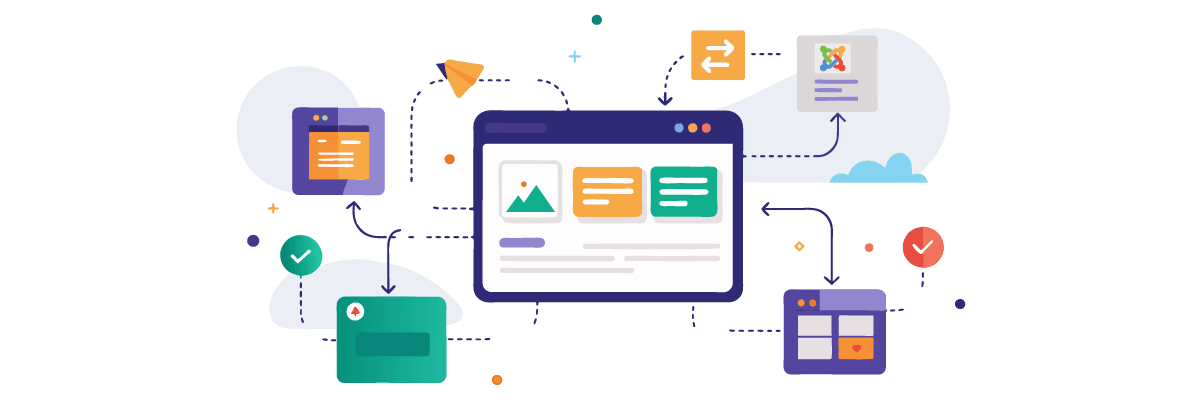
- As its name suggests, Joomla’s native translation is integrated natively within the Joomla CMS meaning it cannot be used with other CMS platforms outside of Joomla. The native translation feature in Joomla allows for translating content directly within the Joomla interface, making it convenient for managing multilingual websites built on the Joomla platform.
- In contrast, cloud AI automatic translation uses API, which can be applied to various CMS platforms and web builders you might use. These APIs provided by companies like Google, Microsoft, or Amazon, enable developers to integrate machine translation capabilities into their applications, websites, or services, regardless of the underlying CMS or web builder used. This approach offers greater flexibility as the translation functionality is not tied to a specific CMS, but can be integrated into any compatible system or platform through the API.
Customization and live editor
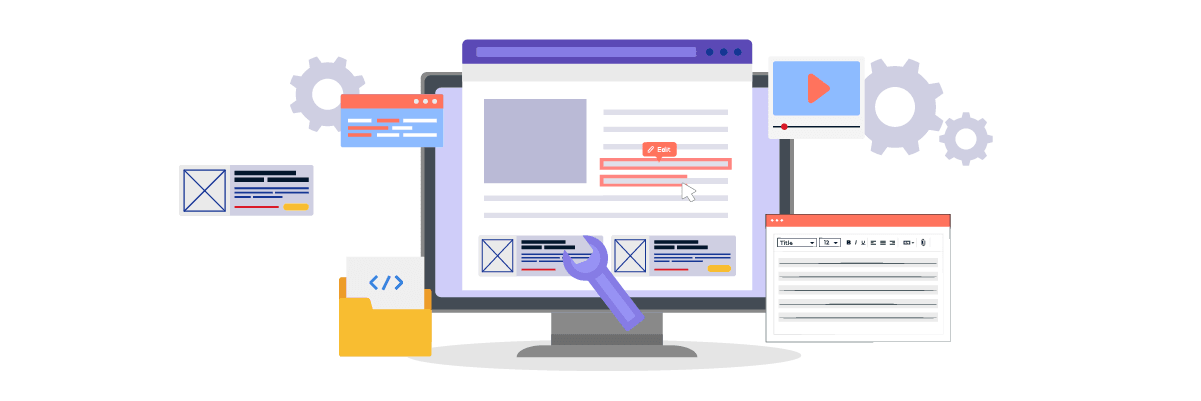
- Joomla 5 native translation provides a translation editor page, giving you complete control over the translation process. You can customize translations, ensure accuracy, and maintain consistency across content sections. However, on this page, users can only compare the original language with its translation, not the machine-translated result. Therefore, human error can still occur despite the presence of an editor.
- Cloud AI automatic translation offers customization and control options, particularly for translation services using Cloud AI technology, such as Linguise. Its front end live editor displays the original language and the system-generated translation. Users can edit the translation if it is not satisfactory.
Translation accuracy

- Human translators in Joomla 5 can better understand the context and nuances of the content as they manually translate Joomla content into the target language, resulting in more accurate and contextually appropriate translations.
- On the other hand, cloud AI automatic translation combines both approaches. It uses advanced translation technology to produce automatic translations and allows users to edit them further. This dual-check process ensures perfect translation accuracy.
Language support

- Joomla version 5 supports 64 languages installed directly from the site’s backend. Joomla 5 translation supports various languages, often determined by the availability of language packs and community contributions.
- Cloud AI automatic translation services typically support more languages, often over 100, including less commonly used languages, leveraging extensive language models.
Language switcher
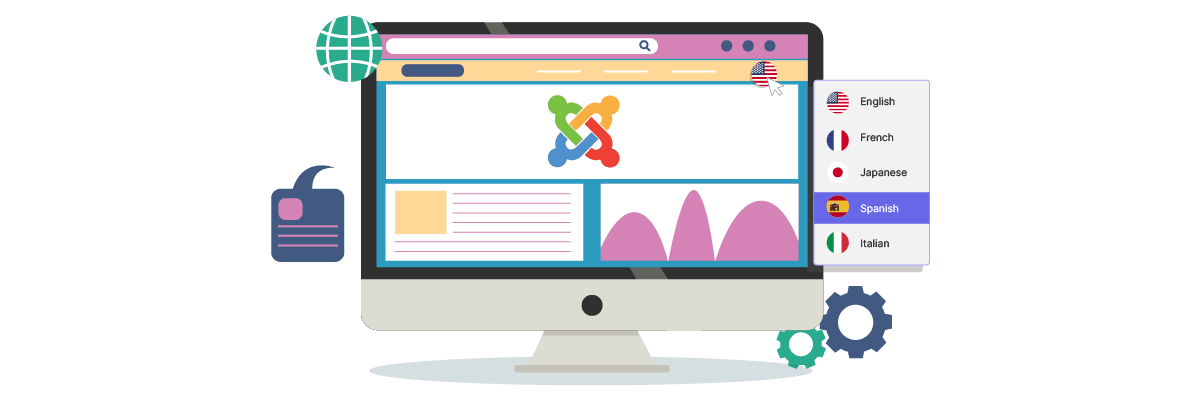
- The Joomla CMS and Joomla 5 native translation allow you to add a language switcher, but configuring this menu on a Joomla website requires a reasonably complex setup involving the installation of additional plugins. Moreover, customization options are limited.
- In contrast, with Cloud AI translation services like Linguise, users only need to copy the language switcher script to Joomla. After that, users can configure it according to their preferences with various settings options such as flag icons, color, size, language names, etc.
Content translation exclusion
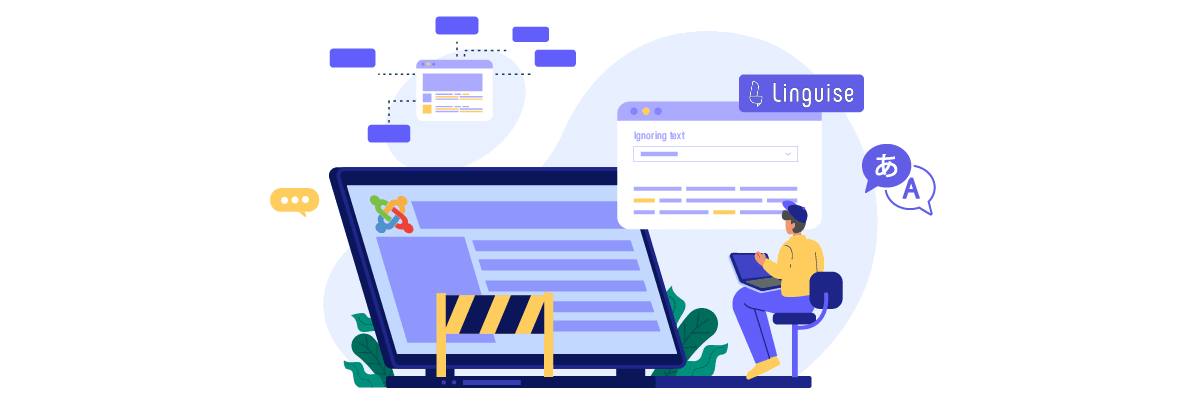
- Joomla 5 does not offer content translation exclusions that can be set based on URLs, pages, or words. If users want to exclude content from translation intentionally, they must do so manually through the translation editor page. This allows for selective translation, excluding specific content or strings, such as proper names or code snippets.
- Translation services using cloud AI technology, such as Linguise, support translation exclusion features, such as ignore text rules. These allow users to set words or content, such as brand names or specific terms, that they do not want translated or left as default.
Collaboration team

- Joomla 5 native translation supports team collaboration by allowing team members to log in using their respective Joomla accounts. However, it is essential to note that you must provide login access to each translator who will collaborate, which could pose a risk of misuse of other features.
- Cloud AI automatic translation services like Linguise also invite and setup translators to the dashboard. However, these translators will be restricted access only to the language they are proficient in. Additionally, translators can only modify the translation results, not the original content.
How to choose the best translation service for the Joomla website?
After understanding the comparison between Joomla 5 native translation and Cloud AI automatic translation, you must also know how to choose the best service for your Joomla website.
- Determine Translation Needs and Requirements—Evaluate the size and complexity of your translation project, whether it is small, medium, or large. Also, consider the need for accuracy, especially if your content has technical complexity or specific nuances that require deep contextual understanding. Additionally, identify the number of languages needed and how uncommon those languages are.
- Set Budget and Time Constraints – Determine how much you can invest in translation in terms of cost and time. Human translation services are more expensive but potentially more accurate, while cloud AI translations are more affordable but may require additional editing. Cloud AI translation technology can provide faster results if you have tight deadlines.
- Level of Control and Customization Needed – If you need complete control over translations and the ability to customize the content, cloud AI translation is a suitable choice with its various features. However, if you do not require extensive customization, Joomla 5 native translation can be a better choice for efficiency and scalability.
- Consider Factors like Integration, Data Security, and Support – If you need seamless integration exclusively with Joomla CMS, native translation might be better. However, cloud AI automatic translation is the right choice if you need support for other CMS platforms.
By thoroughly considering these factors, you can make a more informed decision about the translation service that best suits your Joomla website needs, whether it’s Joomla 5 native translation or cloud AI translation.
Linguise, the best cloud AI automatic translation Joomla website
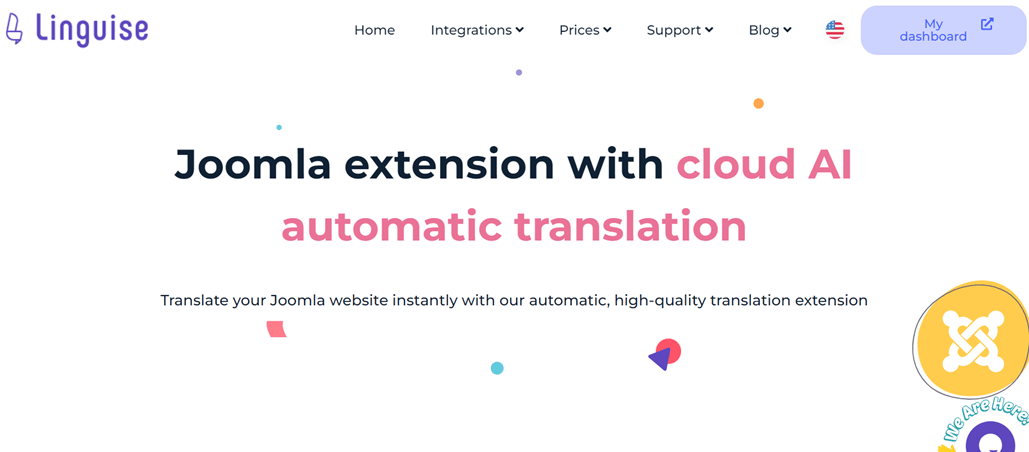
For those who need extensive integration, unlimited customization, and accurate translations, cloud AI automatic translation is the right choice.
One service that utilizes cloud AI technology is Linguise. The Linguise translation service combines advanced neural translation technology with the latest cloud AI translation technology.
This allows Linguise to produce fast and accurate translations. Linguise is also integrated with more than 40 CMS and web builders, making it easy and seamless to install Linguise on Joomla.
Below is a comparison table between Joomla 5 native translation and Linguise Cloud AI automatic translation.
Joomla 5 native translation | Linguise Cloud AI automatic translation | |
Translation process | Manually translate each string or piece of content | Translated automatically by the system |
Integration | Only integrated with Joomla CMS | Integrated for Joomla and 40 other CMS. |
Customization live editor | The live editor is just like a regular content edit page | The live editor allows viewing system translation results and editing directly on the frontend |
Translation accuracy | Accuracy depends on each individual translating | Up to 97% accuracy for almost all language pairs |
Language support | 64 languages available | Provides 85 languages, both popular and less popular |
Language switcher | Requires additional plugins, complex configuration and limited customization | Easy configuration and add language switcher customization |
Translation exclusion | Not available | Provides translation exceptions based on URL, line, page, etc. |
Collaboration team | Collaborate on content translation pages | Collaborate with live editors directly |
Conclusion
At this point, you already know the comparison between original Joomla 5 translation vs Cloud AI automatic translation, in this case, Linguise. You can use the comparison above when choosing a translation service for a Joomla website.
For those interested in using Linguise, it has become the leading AI-powered cloud translation service for Joomla websites. Offering perfect translation quality, translation editor features, and many more, Linguise is the top choice for translating your Joomla site.
To experience Linguise, you can create a free Linguise account and take advantage of a 30-day trial period, which includes up to 600,000 translated words. For more details, visit linguise.com!




